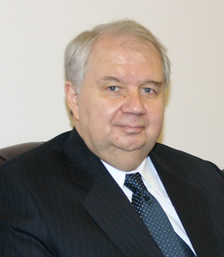
By Christina Bartzokis
As the conflict in Ukraine continues to escalate, some analysts have compared U.S.-Russian relations to the tension of the Cold War. Russian Ambassador to the U.S., Sergey I. Kislyak, disagrees: he believes that current animosity is a result of unresolved Cold War concerns, but not a return to the same competition of the 20th century. In a talk sponsored by the European Studies Council and the Jackson Institute, he explained that Russia’s transition to a market economy and concurrent political transition to democracy after the collapse of the Soviet Union eliminated ideological conflict with the U.S. Instead, he points to the botched reconciliation as the source of tensions. Since a post-Cold War peace was never formally negotiated, Kislyak said, the two countries “haven’t established any mutually understood rules.”

That gap has led to what Kislyak considers economic and military overreach by the U.S. He pointed to American sanctions and military action abroad as evidence that the attempt to construct a mutually beneficial relationship in the aftermath of the Cold War was ineffective. Sanctions demonstrate that “very easily, free trade can be hijacked for political purposes.” In his view, this has triggered a divergence in Russian and American economic interests, and sparked the development of alternative economic systems, including a multinational bank sponsored by the BRICS nations, called the New Development Bank. Additionally, the Ambassador believes that the North Atlantic Treaty Organization (NATO) has not followed through on the agreements that it made with Gorbachev at the end of the USSR. Kislyak asserts that NATO representatives promised that the organization would not expand its operations beyond Western Europe, a promise that has been broken in recent years with campaigns in Bosnia, Kosovo, Iraq, and Libya. Essentially, Russia expected equality after the Cold War, but the current government feels that the U.S. has not delivered on that vision.
These tensions have converged in Ukraine after former President Viktor Yanukovych resigned amid protests last February. Since then, the country has dissolved into civil war, with the new government under President Petro Poroshenko in Kiev fighting secessionists in Eastern Ukraine. Kislyak pointed to U.S. involvement in Ukraine as another instance of American overreach, saying that American support for the Ukrainian opposition against Yanukovych, and now for the new government against the rebels, amounted to “regime change” and the “armed overthrow of a legitimately elected government.” Kislyak portrayed the conflict as an Eastern Ukrainian reaction to an existential threat to their culture by citing an early law eliminating Russian as an official second language and the role of far-right “Neo-Nazis” in both Yanukovych’s removal and the establishment of the new government. The U.S. has lent its support to Poroshenko’s administration, and implemented heavy sanctions against Russia in retaliation for their contended role in helping the separatists.
Despite conflict, Kislyak sees hope for renewed relations in the future. He believes that past Russo-American cooperation on counterterrorism and nuclear non-proliferation will set the stage for future agreements. Specifically, he looked optimistically on the success of negotiations to remove chemical weapons from Syria and ongoing negotiations on nuclear weapons with Iran. Ultimately, Kislyak said, when the U.S. and Russia “work against each other, neither can succeed.”
Christina Bartzokis is a freshman in Jonathan Edwards College. She can be contacted at christina.bartzokis@yale.edu